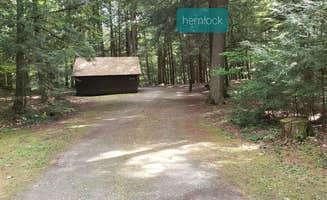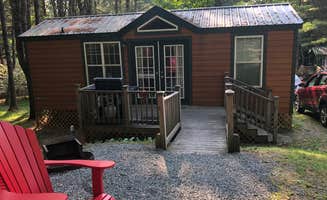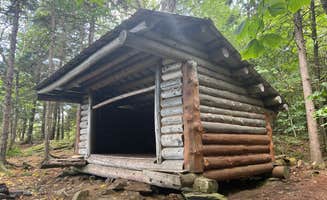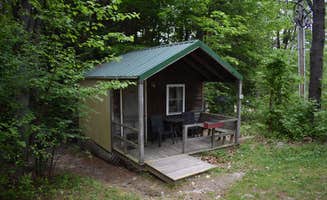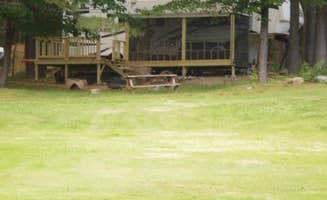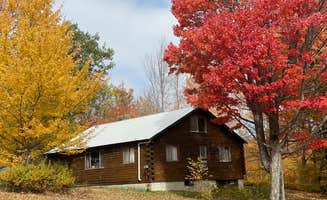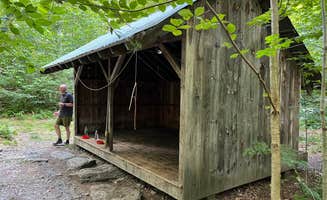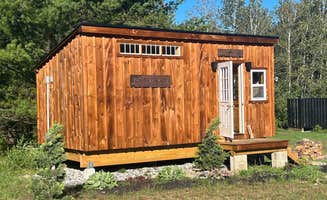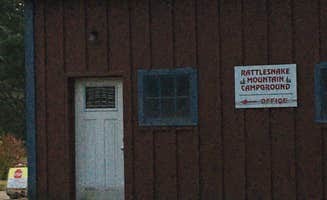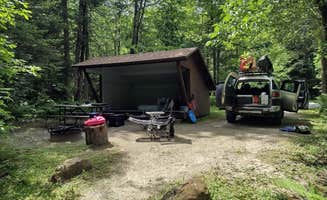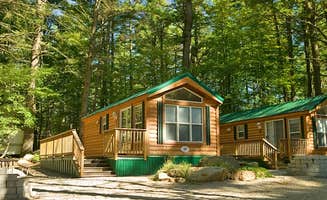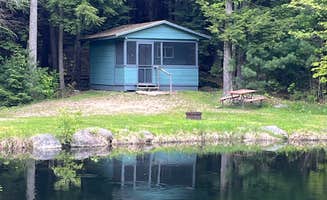Camping cabins near Meriden, New Hampshire sit within the Connecticut River Valley at elevations ranging from 700 to 1,500 feet. The region experiences warm summer temperatures averaging 70-80°F during peak camping season from May through September. Winter cabin rentals face average January temperatures of 18°F with annual snowfall reaching 70-80 inches, making year-round preparation essential for cabin campers in this region.
What to do
Hiking trails from camp: Access the Appalachian Trail directly from Gifford Woods State Park Campground, where trails lead to multiple viewpoints. "The Appalachian Trail runs right through the park and you can hike up to Deer Leep, around Kent Pond, or to Thundering Falls right from the campground," notes a reviewer who appreciates the trail connectivity.
Swimming options: Cool off in rivers accessible from nearby campsites during summer months. At Crows Nest Campground, "there's nice little swimming area on the river for kids," according to one camper who visited with family. The Sugar River provides additional recreational opportunities.
Rail trail biking: Bring bikes to explore converted rail trails within cycling distance of campgrounds. "Close to the Sugar River Rail trail for biking," mentions one visitor about Crow's Nest, highlighting the easy access to paved trails suitable for families and casual cyclists.
Historical sites: Visit nearby Marsh Billings-Rockefeller National Historic Park within 30 minutes of most cabin accommodations. A camper at Quechee-Pine Valley KOA notes that "the campground is located near the Queechee Gorge, covered bridges, hiking trails, good dining, maple syrup/cheese farm, the Marsh Billings-Rockefeller National Historic Park."
What campers like
Riverside camping experience: Waterfront sites offer both scenery and recreation. "This campground has nice, quiet, shaded riverside sites and other site options as well," writes a visitor to Crows Nest Campground who appreciated the water access.
Community kitchen access: Shared cooking facilities provide convenience beyond basic cabin amenities. At Good Night Moon Vintage, "the communal kitchen area is well appointed" according to visitors who value cooking options beyond campfires.
Organized activities: Scheduled events enhance cabin stays at some properties. A KOA visitor mentioned, "They have wonderful activities and the staff are so courteous and helpful," noting the structured recreation opportunities available during their stay.
Cabin privacy levels: Some properties offer more secluded cabin options than others. "The sites are large. If you stay in the back it's quieter," advises a Quechee State Park camper who preferred more isolated accommodations.
What you should know
Water availability varies: Backcountry cabin shelters often lack reliable water sources. A visitor to Trapper John Backcountry Campground reports "There is a water source in the area but it did not have water when I visited (probably on account of the drought)," highlighting the need to carry water when staying at trail shelters.
Shower facilities differ: Pay showers exist at some established campgrounds while backcountry shelters have none. "Showers are $0.25 for 8 minutes," notes a Crow's Nest camper, providing specific cost information for budget planning.
Road noise concerns: Some cabin locations experience traffic sounds despite wooded settings. A Quechee State Park visitor recommended specific sites, noting "We recommend site 11 or the BIRCH lean to as the 2 most spacious and/or secluded sites, as the campground is not too far off route 4 and you may hear cars/trucks."
Winter accessibility: Most cabin accommodations close seasonally but a few remain open year-round with limited services. Gifford Woods operates from "May 19 to October 16," according to their season information, typical of most properties in the region.
Tips for camping with families
Kid-friendly programs: Look for properties offering structured activities for children. At Quechee-Pine Valley KOA, "Rangers also run fun programs for children - my children churned butter and made popcorn over the campfire one night, and made tie dyed T-shirts the next (for no fee.)" This provides built-in entertainment options.
Swimming safety: Evaluate river swimming spots before allowing children in water. "There is a nice field for kids to play in" at Quechee State Park according to one visitor who appreciated the land-based recreation options for families.
Bathroom cleanliness: Family-friendly facilities maintain higher sanitation standards. "The bathroom is very clean. They offer showers that cost you a few quarters," notes a camper who appreciated the family-appropriate facilities.
Cabin capacity considerations: Verify sleeping arrangements when booking for families. Quechee-Pine Valley KOA offers "camping cabins, some of which have kitchenettes and bathrooms that sleep six people," providing sufficient space for larger family groups.
Tips from RVers
Site leveling challenges: Some cabin areas accommodate RVs but present leveling difficulties. A visitor to Caton Place Campground noted "The pull through site is not level and is barely long enough to fit my 43' rig," warning about potential challenges with larger vehicles.
Road width limitations: Access roads may restrict large rig maneuverability. "The roads aren't wide enough to take a motorhome into," cautions an RVer who experienced difficulty navigating to their site.
Seasonal site preferences: Consider options for extended stays at properties with both cabins and RV sites. "This campground is more for seasonal campers," observed a visitor, indicating the availability of longer-term arrangements beyond weekend stays.
Utility hookup variations: Properties offering both cabins and RV sites provide different service levels. "Some sites are full hookup while others are not and that is reflected in the cost," explains a KOA visitor, noting the price difference between basic and full-service options.


